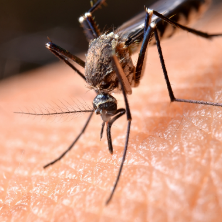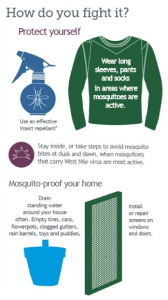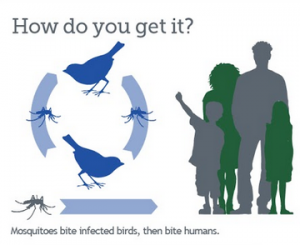 Colorado Department of Public Health and Environment reported West Nile Virus for the first time this season in Weld County, Colorado. Some counties and municipalities trap mosquitoes and test them in laboratories. These tests provide an estimate of the number that are infected with the virus and determine the risk to humans in the area. However, not all counties test mosquitoes, so it’s important to take precautions throughout the summer.
Colorado Department of Public Health and Environment reported West Nile Virus for the first time this season in Weld County, Colorado. Some counties and municipalities trap mosquitoes and test them in laboratories. These tests provide an estimate of the number that are infected with the virus and determine the risk to humans in the area. However, not all counties test mosquitoes, so it’s important to take precautions throughout the summer.
Colorado reported 35 human cases of the West Nile Virus infections with one death in 2020. Generally, most West Nile cases are reported in August and September.
Protect Yourself
- Use a registered insect repellent
- Repellents are registered with the Environmental Protection Agency (EPA)
- Check whether your insect repellent has the right active ingredient by going to the search tool on the EPA’s website.
- Select a repellent with one of the following active ingredients: DEET, Picaridin (known as KBR 3023 and icaridin outside the US), IR3535, oil of lemon eucalyptus (OLE), Para-menthane-diol (PMD), and 2-undecanone
- Use as directed on the label. Do not spray repellent on the skin under clothing
- Apply sunscreen first and then the repellent second
- They are safe to use even for pregnant and breastfeeding women
- Non-EPA registered insect repellents have not been tested for effectiveness and are therefore not recommended
- Repellents are registered with the Environmental Protection Agency (EPA)
- Limit outdoor activities at dusk and dawn when mosquitoes are most active
- Wear protective clothing (long pants, long-sleeved shirts, and socks) in areas where mosquitoes are active
- Spray clothes with insect repellent for extra protection
- Permethrin (0.5%) can be used to treat clothes, boots, socks and tents. Watch this video for more information how to use permethrin
Protect Your Children

- Dress in clothing that covers their arms and legs
- Use mosquito netting to cover strollers and baby carriers
- When using insect repellent on children:
- Always follow the instructions on the label
- Do not use repellents with oil of eucalyptus (OLE) or para-menthane-diol (PMD) on children under 3 years old
- Adults: Place the repellent on your hands and then apply to child’s face, washing hands afterwards
- Do not apply repellent on child’s hands, eyes, mouth, cuts, or irritated skin
Mosquito-proof Your Home
- Drain standing water around your house at least once a week
- Empty water from tires, cans and flowerpots
- Additionally, check for standing water in clogged gutters, rain barrels, birdbaths, toys, and puddles
- Install or repair screens on windows and doors
How You Become Infected
Mosquitoes spread West Nile Virus. They contract the virus when they feed on infected birds. Then they spread the virus to people or other animals by biting them. West Nile virus has been detected in over 300 species of birds. Most birds survive the virus except for crows and jays.
Touching live or dead animals does not spread West Nile Virus. Nevertheless, avoid bare-hand contact with dead animals. To dispose of a dead bird, use gloves or double plastic bags to place it in a trash bin.
There are no vaccines to prevent or medications to treat West Nile Virus in people. Ten percent of infected people develop symptoms. These symptoms can include: fever, diarrhea, rash, vomiting, body aches, and headache. Most people recover completely from West Nile Virus. While others experience fatigue and weakness for weeks and months. About 1 in 150 people infected with West Nile virus develop severe symptoms, including convulsions, disorientation, coma, tremors, muscle weakness, vision loss, high fever, stupor, headache, neck stiffness, numbness and paralysis. People over 60 years old and people with immune-compromised conditions are at a higher risk for severe illness. About 1 in 10 of those who develop severe illness die. Above all, it is important to consult with your healthcare professional if you develop any of the symptoms above.


Thanks for this article on West Nile!
Thanks!